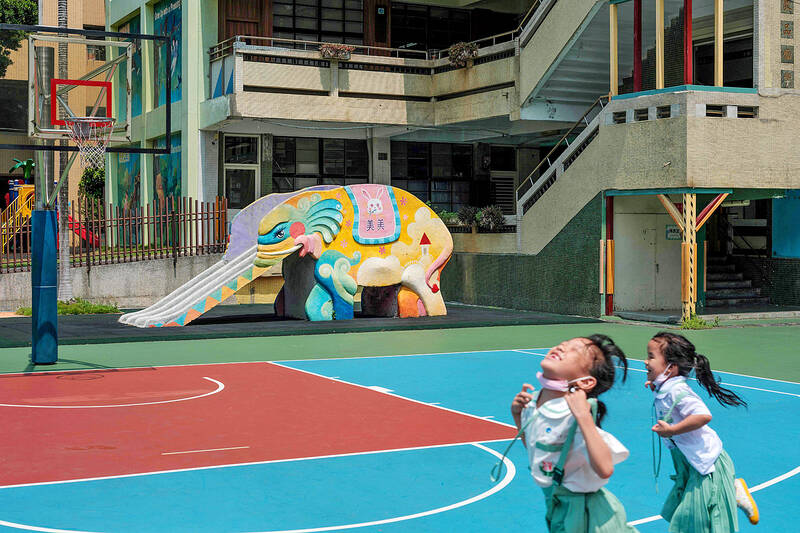In playgrounds across Taiwan, a jumbo surprise awaits children in the form of colorful elephant slides, evoking nostalgia for older Taiwanese, who say the structures used to be ubiquitous across the nation.
Affectionately known as “Grandpa Elephant,” the slides are primarily made of terrazzo or concrete and were once a regular schoolyard feature during the 1960s and 1970s.
However, their sightings have dwindled since the nation tightened playground safety regulations, with some slides removed, while others are off-limits to children.

Photo: Yan ZHAO, AFP
“The elephant slide is like a friend who grew up with us,” said Yu Chiu-ling (尤秋玲), 58, who has been documenting the remaining structures since 2010.
Yu, a writer, said the idea for the project was ignited by a visit to her old elementary school in Changhua County’s Lukang Township (鹿港) where the sight of the elephant slide sparked intense nostalgia in her.
“Many things had changed except the elephant. It’s still round and chubby, and it hasn’t aged, it’s well-preserved,” Yu told reporters. “It was quite emotional to see it again, it felt like it had been waiting for me.”
Yu thought others her age would have similar feelings so she began visiting schools across Taiwan to record the remaining elephant slides, sharing photographs, stories and their locations on Facebook.
“The elephant slide is a memory shared across generations of Taiwanese, who find resonance in it,” she said.
Her Facebook group, “Find our Elephant Friends (slides),” has become a gathering place for those with fond memories of their childhood slides, with members sharing locations and stories of the ones they rediscovered.
Some of the slides have colorful tiles, others fantastical scenes painted on them, and a few rare ones resemble a real elephant — although all feature a wide trunk that doubles as a slide.
The origin of the elephant slide remains unclear. Most believe it was chosen as a playground staple because an elephant trunk was ideal for children to glide down. Some have suggested it was inspired by Taiwan’s beloved Lin Wang (林旺), an Asian elephant born in 1917.
Lin Wang was captured by Chinese troops from Japanese forces in Myanmar during World War II. He was transported to Taiwan in 1947 and died in 2003 at Taipei Zoo at the age of 86.
Most of the slides still standing today have slogans on them reflecting the era of their creation.
Older ones feature phrases like: “Strengthen your body to build the country” and “Love our country” — evoking a sense of patriotism that Taiwan’s then Chinese Nationalist Party (KMT) government wanted to foster after fleeing China for Taiwan.
Newer structures say “beauty” and “liveliness.”
Between 400 and 450 slides remain, said Hsiu Pi-cheng, a Taiwanese designer who has traversed the nation to photograph the slides and pinned their locations on an online map.
However, many schools have sealed off the slides, transforming them into art installations instead.
“I hope they can be preserved and continue to create happy memories for children,” Yu said.

An essay competition jointly organized by a local writing society and a publisher affiliated with the Chinese Communist Party (CCP) might have contravened the Act Governing Relations Between the People of the Taiwan Area and the Mainland Area (臺灣地區與大陸地區人民關係條例), the Mainland Affairs Council (MAC) said on Thursday. “In this case, the partner organization is clearly an agency under the CCP’s Fujian Provincial Committee,” MAC Deputy Minister and spokesperson Liang Wen-chieh (梁文傑) said at a news briefing in Taipei. “It also involves bringing Taiwanese students to China with all-expenses-paid arrangements to attend award ceremonies and camps,” Liang said. Those two “characteristics” are typically sufficient

A magnitude 5.9 earthquake that struck about 33km off the coast of Hualien City was the "main shock" in a series of quakes in the area, with aftershocks expected over the next three days, the Central Weather Administration (CWA) said yesterday. Prior to the magnitude 5.9 quake shaking most of Taiwan at 6:53pm yesterday, six other earthquakes stronger than a magnitude of 4, starting with a magnitude 5.5 quake at 6:09pm, occurred in the area. CWA Seismological Center Director Wu Chien-fu (吳健富) confirmed that the quakes were all part of the same series and that the magnitude 5.5 temblor was

The brilliant blue waters, thick foliage and bucolic atmosphere on this seemingly idyllic archipelago deep in the Pacific Ocean belie the key role it now plays in a titanic geopolitical struggle. Palau is again on the front line as China, and the US and its allies prepare their forces in an intensifying contest for control over the Asia-Pacific region. The democratic nation of just 17,000 people hosts US-controlled airstrips and soon-to-be-completed radar installations that the US military describes as “critical” to monitoring vast swathes of water and airspace. It is also a key piece of the second island chain, a string of

The Central Weather Administration has issued a heat alert for southeastern Taiwan, warning of temperatures as high as 36°C today, while alerting some coastal areas of strong winds later in the day. Kaohsiung’s Neimen District (內門) and Pingtung County’s Neipu Township (內埔) are under an orange heat alert, which warns of temperatures as high as 36°C for three consecutive days, the CWA said, citing southwest winds. The heat would also extend to Tainan’s Nansi (楠西) and Yujing (玉井) districts, as well as Pingtung’s Gaoshu (高樹), Yanpu (鹽埔) and Majia (瑪家) townships, it said, forecasting highs of up to 36°C in those areas